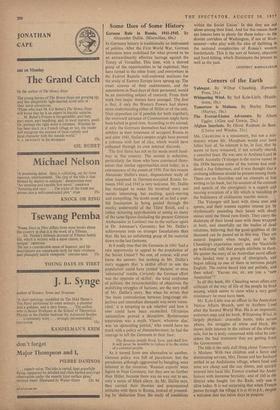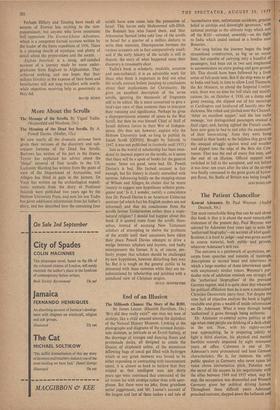Corners of the Earth
Afghan Interlude. By Oliver Rudston de Baer. (Chatto and Windus, 21s.) MR. CHASELING is a missionary, but not a mis- sionary whom Mr. Maugham would ever have fallen foul of. So tolerant is he, in fact, that he seems to have witnessed, if not actually shared, a cannibal feast. He was sent to Arnhem Land in North Australia (Yulengor is the native name) in the 1930s because some of the natives had mur- dered a Jap fisherinan, and it was thought that a civilising influence should be present among them. There are no flourishes and no attempts at line writing in his book, but his account of the customs and speech of the aboriginals is a superb and moving evocation of a life which is vanishing as the bulldozers of civilisation rumble nearer.
The Yulengor still hunt with stone axes and spears, and their women express intense joy by rhythmically pounding their heads with sharp stones until the blood runs freely. They carry the skeletons of their loved ones with them wrapped in bark, and cheerfully eat the bodies of dead relations, believing that the good qualities of the deceased can be passed on in this way. They are natural linguists when taught, and in Mr. Chaseling's experience rarely use the `blackfella go walkalong' talk that people attribute to them. He quotes the story of an Australian naval officer who landed near a group of aboriginals, and began talking to one of them in tortuous pidgin English. The native heard him out politely, and then asked : 'Excuse me, sir, are you a "new Australian"?'
In all this book, Mr. chaseling never offers any criticism of the way of life of the people he lived among, which seems to show what a very good missionary he must have been.
Mr. Kyle-Little was an officer in the Australian Native Affairs Branch, sent to Arnhem Land after the Second World War. He is an impatient, extrovert man and his book, Whispering Wind, is largely physical : crocodile hunts, treks across plains, the struggles of white and black. He shows little interest in the culture of the aborigi- nals, but he is hotly concerned with what he con- siders the bad treatment they are getting from the Government.
The title is the only dull thing about Tomorrow is Mariana. With two children and a fierce and dominating servant, Mrs. Deane and her husband settled in an Andalusian village, where food and wine are cheap and the sun shines, and quickly entered into local life. Franco crushed the Anda- lusians with immense brutality, and of 160 in the district who fought for the Reds, only one is alive today. It is not surprising that when Franco passes through the village it is at 60 m.p.h., despite a welcome that has taken days to prepare. Perhaps Hillary and Tenzing have made all ascents of Everest less exciting to the non- mountaineer, but anyone who loves mountains Will appreciate The Everest-Lhotse Adventure, which is a competent factual account written by the leader of the Swiss expedition of 1956. There is a pleasing dearth of mystique, and plenty of detail about the preparations and the ascent.
Afghan Interlude is a smug, self-satisfied account of a journey made by some under- graduates from England to Afghanistan. They achieved nothing, and one hopes that their tedious frivolity at the expense of their hosts and benefactors will not stop travellers with worth- while objectives receiving help as generously as they did.
DAVID STONE































 Previous page
Previous page